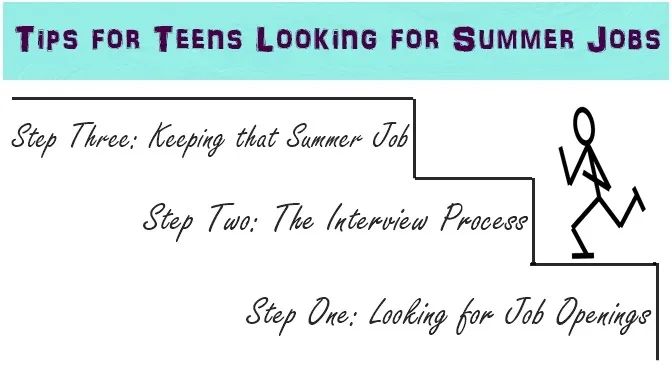
Tips for teens looking for summer jobs
Whether your summer employment is a requirement or an opportunity for you to gain experience before you graduate, there are some things you can do to ensure the position you select is right for you! It’s also important to ensure you’re doing the right things, as the summer job market is competitive and you don’t want to miss out on the job you really want.Step One: Looking for Job Openings
- Keep your options open, but at the same time use summer employment to start to narrow in on what field you might enjoy working in someday.
- Establish a flexible schedule for yourself. True, you may have sports camps, band camps, etc., but outside of scheduled events, market yourself as having flexible hours other than those times.
- Take it upon yourself to go out and collect applications. Dress business casual and remember that you’re making a first impression. You have no idea if the person handing you the application is the hiring manager or not.
- Be your own representative. Yes, you may need your parent or an adult’s help for transportation, but make your own phone calls, introduce yourself, and own your pursuit to ensure a summer position.
Step Two: The Interview Process
- If you’ve been actively applying for jobs, answer your phone, even if it’s a number you don’t know. Hiring Managers do not mind leaving voice mails, but repetitive phone tag takes time and they may not have that sort of time to wait to hire.
- Speak clearly and directly. If a recommended time does not work for an interview, suggest a better time. Phone skills may be part of the potential job expectations and when a hiring manager speaks on the phone with you it can count as part of the interview.
- Dress for the environment you’d be working in. For example, if it’s an office setting, dress professionally. If it’s a stocking position, dress business casual.
- Practice eye contact and a firm handshake.
- Come with questions of your own, ask about the business itself and learn more about potential co-workers.
- Most of all, understand that employers expect applicants to be a little nervous. It’s okay to slow down and take your time collecting your thoughts before you answer their questions. Show that you are excited, as that excites potential employers.
Step Three: Keeping that Summer Job
- Remember, represent yourself. If you have questions, ask questions. If you have concerns, politely share your concerns with a supervisor. Don’t participate in spreading rumors with co-workers and if there’s an issue, attempt to handle it before you have a parent or another adult step in.
- Maintain your flexibility. Supervisors understand that there are going to be some days/times that you just cannot be there due to other commitments. If workers are typically able to step up and help out outside of their scheduled shifts that demonstrates leadership and commitment. Both great qualities to have mentioned in future reference checks.
- On good days and bad days, remember your employer’s expectations and strive to meet them. One easy day turns into two easy days, which leads to streaks of slacking off.
- Understand that it’s only a summer job if you treat it that way. This experience goes with you, even after you return to school. It’ll follow you to the next job and your first career position.

